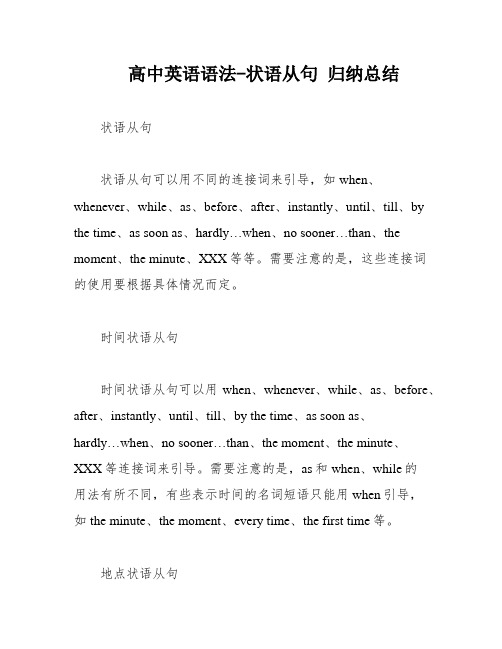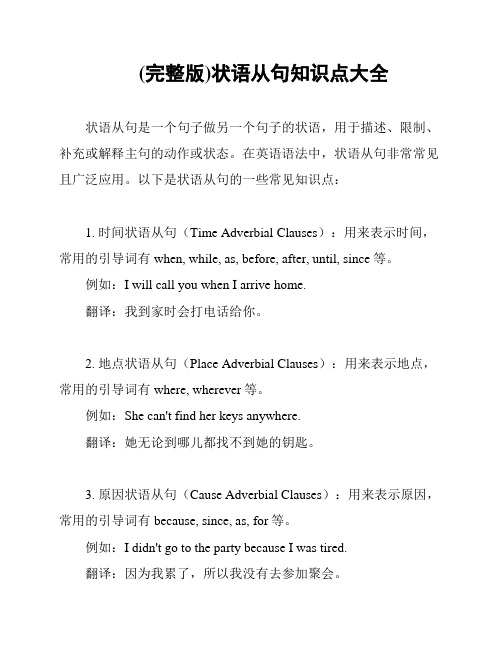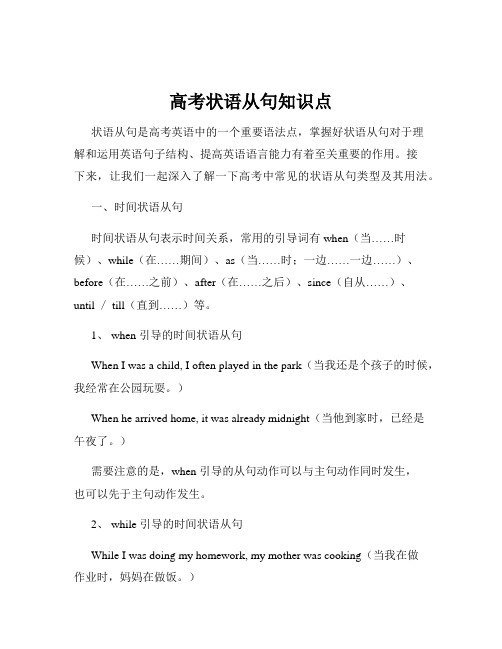高一英语考点之状语从句
- 格式:docx
- 大小:23.52 KB
- 文档页数:3

状语从句1. 时间状语从句常见的连词(组):when, while, as, before, after, once, till, until, as soon as, now that, hardly ...when, scarcely ...when, no sooner ...than等。
可以引导时间状语从句的副(介)词(短语)或名词短语:directly, instantly, immediately, by the time, the moment, the second, the minute, the instant, every time, each time, next time, the last time等。
注意点如下:(1) when, while, as引导的时间状语从句as表示“当……的时候”,往往和when/ while通用,但它着重强调主句与从句的动作或事情同时或几乎同时发生。
when(at or during the time)既可以表示在某一点的时候,又可以表示在某一段时间内,主句与从句的动作或事情可以同时发生也可以先后发生。
while强调一段时间,仅表示从句和主句的动作同时发生,并且有延续意义,该从句中的动词一般要用延续性动词,从句中常用过去进行时态或一般过去时态;当when表示a period of time 时,两者可以互换。
She came up as I was cooking.(同时)在我做饭时,她走了过来。
When we were at school, we went to the library every day.(在一段时间内)当我们在学校时,每天都去图书馆。
While they were watching TV, I was preparing myself for the coming examination.他们在看电视,而我在为即将到来的考试做准备。

高中英语语法-状语从句归纳总结状语从句状语从句可以用不同的连接词来引导,如when、whenever、while、as、before、after、instantly、until、till、by the time、as soon as、hardly…when、no sooner…than、the moment、the minute、XXX等等。
需要注意的是,这些连接词的使用要根据具体情况而定。
时间状语从句时间状语从句可以用when、whenever、while、as、before、after、instantly、until、till、by the time、as soon as、hardly…when、no sooner…than、the moment、the minute、XXX等连接词来引导。
需要注意的是,as和when、while的用法有所不同,有些表示时间的名词短语只能用when引导,如the minute、the moment、every time、the first time等。
地点状语从句地点状语从句可以用where或XXX来引导。
其中,where 表示某一个地方,而XXX则表示任何一个地方。
原因状语从句原因状语从句可以用because、since、for、as、now that等连接词来引导。
需要注意的是,because语气最强,用来说明人所不知的原因,回答why提出的问题。
而as和since则用来说明显而易见的或已为人们所知的原因。
如果由because引导的从句放在句末并且前面有逗号,则可以用for来代替。
而now that则表示“既然”,需要注意它只能用于现在发生的情况,而since可以用于现在和过去。
条件状语从句条件状语从句可以用if、unless、once、in case、as long as、on n that等连接词来引导。
需要注意的是,多用一般时态,如果表示一般将来的情况,就用一般现在时,如果表示过去将来的情况,就用一般过去时。

(完整版)状语从句知识点大全状语从句是一个句子做另一个句子的状语,用于描述、限制、补充或解释主句的动作或状态。
在英语语法中,状语从句非常常见且广泛应用。
以下是状语从句的一些常见知识点:1. 时间状语从句(Time Adverbial Clauses):用来表示时间,常用的引导词有when, while, as, before, after, until, since等。
例如:I will call you when I arrive home.翻译:我到家时会打电话给你。
2. 地点状语从句(Place Adverbial Clauses):用来表示地点,常用的引导词有where, wherever等。
例如:She can't find her keys anywhere.翻译:她无论到哪儿都找不到她的钥匙。
3. 原因状语从句(Cause Adverbial Clauses):用来表示原因,常用的引导词有because, since, as, for等。
例如:I didn't go to the party because I was tired.翻译:因为我累了,所以我没有去参加聚会。
4. 结果状语从句(Result Adverbial Clauses):用来表示结果,常用的引导词有so, therefore, thus等。
例如:He studied hard, so he passed the exam.翻译:他努力研究,所以他通过了考试。
5. 条件状语从句(Condition Adverbial Clauses):用来表示条件,常用的引导词有if, unless, provided that等。
例如:If it rains tomorrow, we won't go to the park.翻译:如果明天下雨,我们不会去公园。
6. 目的状语从句(Purpose Adverbial Clauses):用来表示目的,常用的引导词有so that, in order that等。

I. 讲解1. 概述状语从句在句中相当于副词做状语,又叫副词性从句。
掌握状语从句应当引导词入手,注意引导词的词义,引导状语从句的引导词都有词意,所以,了解引导词的意思尤为重要。
引导词按意义分为九类:1) 时间when , as , while , till , until , before, after , since 2) 地点where3) 原因because , as , since , now that 4) 条件if , unless , once .so (as)long as . in case5) 让步though , whatever (---ever) as, even though, even if 6) 目的so that, in order that7) 结果so ... that 8) 比较than, as .. as9) 方式as , as if例如:2.1)连用,表示3)You’I don’t know where he came from. (________从句) Where he has gone is not known yet.(_________从句)This is where they once lived. (_________从句)II.巩固练习1. John shut everybody out of the kitchen ______he could prepare his grand surprise for the party.A. which ??????????B. when ?????????????C. sothat ?????????????? D. as if2. I would appreciate it ________you call back this a fternoon for the doctor’s appointment.A. until?????????????????????????B. if???????????????????C. when???????????????????????D. that3. After the war, a new school building was put up ________there had once been a theatre.A. that??????????????????????????B. where??????????????????????C.which?????????????????????? D. when4. —Is Mr. Smith in the office?—Yes, ________ he is in charge of the office, he must be there.A. since????????????????????????B. however???????????????????C. whether???????????????????D. for5. As your good friend, I will do ________help you.A. that I can to????????B. what I can to?????C. all that I can???????D. what I can6. John may phone tonight. I don’t want to go out ________he phones.A. as long as????????????B. in order to???????C. in case??????????????D. so that7. Someone called me up in the middle of the night, but they hung up ________I could answer the phone.A. as???????????????????B. since???????????C. until??????????????????D. before8. No matter ________hard it may be, I will carry it out.A. what????????????B. whatever???????C. how?????????D. however9.________ you may do, you must do it well.D. whatever13.done?????it takes???21.________comes to the party will receive a gift.A. Which?????????B. Who????????C. Which one???D. Whoever22. She is willing to help you, ________busy she is.A. what??????????B. how?????????C. however???D. whatever23. No matter ________hard it may be, I’ll carry it out.A. what??????B. whatever???????C. how?????????????D. however24. W hy do you want to find a new job ________you’ve got such a good one already?A. that????????????????????B. where?????????C. which????????????D. when25.________he is, he will be thinking of you.A. Wherever?B. Where???????C. Now that?????????D. As soon as26. You should make it a rule to leave things ________you can find them again.A. when?????????????????????B. where????????C. then????????D. there27. He got excited at the news, ________ I was calm.A. when???????????????????B. while????????C. because??????D. after28. —Shall Brown come and play computer games? —No, ________ he has finished his homework.A. when?????????????????B. if????????????C. unless??????????????D. once29.________ you try, you will never succeed.A. If????????????????????B. Until?????????????C. Since?????D. Unless30. Hardly had he arrived in Hong Kong ________he rang me up.A. when????????????????B. than????????????C. that??????????D. and31. What we have seen is different ________.A. from what we heard????B. to all what we heardD.33.have????III“A from It about whathad picked him up. himself,) to all’tll find a 13The young man slowly 14 into his pocket. “This is it!” thought John. At that 15 moment he considered shouting for help, but instead of a gun, the hitchhiker pulled out several 16 . “Oh, no. I don't want you r money. Just get out. Okay?”The young man looked 17 . He insisted on 18 John the money. John watched until his 19 had disappeared from sight, then stepped on the 20 and drove out of town.1. A. asleep B. early C. strong D. awake2. A. on B. off C. up D. over3. A. outside B. news C. speed D. way4. A. there B. earlier C. then D. moment5. A. Without B. After C. By D. For6. A. happy B. sad C. angry D. sorry7. A. wore B. owned C. had D. made8. A. place B. subject C. question D. face9. A. remembered B. thought C. heard D. forgot10. A. got B. arrived C. changed D. turned11. A. paying B. having C. carrying D. borrowing12. A. afraid B. hungry C. cold D. sleepy13. A. restaurant B. shop C. hotel D. station14. A. reached B. forced C. got D. put15. A. important B. very C. long D. short16. A. knives B. photos C. handkerchiefs D. billsthe back door open one morning and was held up at gunpoint by three armed robbers. While trying to open the safe, his hand, shaking from nervousness, slipped off the combination. The robbers panicked and shot him. Luckily, Jerry was found relatively quickly and rushed to the local hospital. After 18 hours of surgery and weeks of intensive care, Jerry was released from the hospital with fragments of the bullets still in his body.I bumped into Jerry about six months after the terrifying accident. When I asked him how he was, he replied, “If I were any better, I’d be twins. Want to see my scars?” I declined to see his wounds, but did ask him what had gone through his mind as the robbery took place. “The first thing that went through my mind was that I should have locked the back door,” Jerry replied. “Then, as I lay on the floor, I remembered that I had two choices: I could choose to live, or I could choose to die. I chose to live.” “Weren’t you scared?” I asked.Jerry continued, “The paramedics were great. They kept telling me I was going to be fine. But when they wheeled me into the emergency room and I saw the expressions on the faces of the doctors and nurses, I got really scared. In theireyes, I read, ‘He’s a dead man.’ I knew I needed to take action.” “What did you do?” I asked. “Wel l, there was a big nurse shouting questions at me,” said Jerry. “She asked if I was allergic to anything. ‘Yes’ I replied. The doctors and nurses stopped working as they waited for my reply. I took a deep breath and yelled, ‘Bullets’. Over their laughter I told them, ‘I am choosing to live. Operate on me as if I am alive, not dead.’ ”Jerry lived thanks to the skill of his experienced doctors, but also because of his amazing attitude. I learned from him that every day we have the choice to live fully.1. By saying “If I were any better, I would be twins” (Paragraphs 1&7), Jerry means that _______.A. he felt depressed in lifeB. he was content with his lifeC. he regretted not having a twin brotherD. he attempted to live as good a life as his twin brother2. According to Paragraph 3, what did the writer think of Jerry’s positive thinking style at first?A. He accepted it and tried to copy it.B. He was jealous of and even hated it.A. J1-6 BDBAC概述:As 11.2. C.3. B.4. C. 强调时间“then”,意为“就在那时候”。

完整版)高中状语从句归纳状语从句是在句子中做状语的,包括时间、条件、让步、原因、目的、结果、比较、地点、方式状语从句。
时间状语从句可以由when、as、while、until、not…until、before、after、since、the minute、the moment、each (every。
next。
the first) time等引导。
在时间状语从句中,一般使用一般现在时或一般过去时来表达。
1.时间状语从句引导词当句子中有时间状语从句时,可以用when、as、while、until、not…until、before、after、since、the minute、the moment、each (every。
next。
the first) time等来引导。
这些引导词在句子中的使用有不同的侧重点和用法。
1.1 when当我们用when引导时间状语从句时,它的主语和主句的主语相同。
如果从句的谓语动词是be动词,那么从句的主语和be可以省略。
例如:When I arrived home。
I had a little rest.1.2 asas不仅可以表示“当。
的时候”,还可以表示“一面。
一面”和“随着”的意思。
例如:XXX(一面。
一面)You will XXX(随着)1.3 whileXXX表示“当。
的时候”,强调主句的动作和从句的动作同时发生。
从句一般使用进行时,动词必须是延续性动词。
例如:While we were working。
they were having a rest.While they were having a n。
they got very confused.注意:while也有对比的含义,可以解释为“然而”。
例如:XXX。
XXX.2.until和not。
untiluntil和not。
until都表示“直到。
才”。
在肯定句中,主句常用延续性动词;在否定句中,主句常用短暂性动词。


状语从句1. 时间状语从句(1) when引导的时间状语从句①when引导的时间状语从句,其动词既可以是延续性动作的动词,也可以是瞬间性动作的动词,可以表示主句的动作和从句的动作同时发生,或从句的动作发生在主句的动作之前。
when you apply for a job, you must present your credentials.当你申请工作时,你必须递交你的有关证件。
(同时)when the students heard the teacher’s footsteps, they a ll adopted talking.当学生们听到老师的脚步声时,他们都停止了讲话。
(从句动作发生在前)② when还可表示just then(正在那时)的意思,此时其所引导的从句只放在主句之后。
we were about to start when it began to rain. 我们正要动身,突然天下起雨来。
The game had hardly/scarcely/barely begun when it started raining. 比赛刚刚开始就下起雨来。
(2) as引导的时间状语从句as侧重表示主句和从句的动作并相发生,翻译成一边,一边。
We were having breakfast as she was combing her hair. 她梳头时我们在吃早饭。
(3) while引导的时间状语从句while或“在……期间”,所引导的从句的动作是延续性的,并表示和主句的动作同时发生。
When the teacher paraphrased the text in English, the students listened attentively and took notes. 当老师用英语解释课文时,学生们聚精会神地听并做着笔记。
I can learn while I work. 我可以边工作边学习。

高考状语从句知识点状语从句是高考英语中的一个重要知识点,掌握好它对于我们在高考中取得好成绩可是相当关键哦!今天咱们就来好好聊聊状语从句。
先来说说啥是状语从句。
简单来讲,状语从句就是用一个句子来充当状语。
那啥是状语呢?就好比咱们跑步的时候,给你加油打气的那些话,告诉你跑快一点、跑慢一点、往这边跑、往那边跑,这些起辅助说明作用的就是状语。
而用一个句子来做这个辅助说明的工作,那就是状语从句啦。
状语从句的种类那可不少,有时间状语从句、地点状语从句、原因状语从句、条件状语从句、目的状语从句、结果状语从句、让步状语从句、比较状语从句和方式状语从句等等。
咱们先来说说时间状语从句。
比如说“When I was a child, I often played in the park” 这里的“When I was a child”就是一个时间状语从句,表示“当我还是个孩子的时候”。
再比如“While I was doing my homework, my mom was cooking dinner” 这里的“While I was doing my homework”表示“当我正在做作业的时候”。
记得我以前教过一个学生,叫小李。
有一次考试,他就因为时间状语从句丢了不少分。
那次考试有一道题是这样的:“______ he came in, I was reading a book” 选项有“When、While、As”。
这小李啊,想都没想就选了“While”,结果就错啦。
后来我给他分析,这题应该选“When”,因为“While”强调的是动作的同时进行,而这里“came in”是一个短暂性动作,“reading a book”是一个持续性动作,所以要用“When”。
从那以后,小李可长记性了,每次遇到时间状语从句的题都会仔细分析。
接下来是地点状语从句。
像“Where there is a will, there is a way” 意思就是“有志者,事竟成”,这里的“Where there is a will”就是地点状语从句,表示“有意志的地方”。

高中英语语法:状语从句知识点状语从句(adverbial clause)在句中作状语,可修饰主句中的动词、形容词和副词等。
状语从句由从属连词引导。
状语从句可放在句首或句末。
放在句首时,从句后面常用逗号;放在句末时,从句前面往往不用逗号。
状语从句根据它们的含义分为时间、地点、原因、目的、结果、方式、让步、条件、比较等九种。
一、时间状语从句1、while, when, whenever和as的用法比较(1)while常表示一段较长的时间或一个过程,强调主句的动词和从句的动词所表示的动作或状态是同时发生的。
它不能表示一时性或短暂的动作。
Don't talk so loud while( as) others are working.别人工作时,请勿大声说话。
(2)when引导的时间状语从句,可指时间的一点,也可以指一段时间,从句的谓语动词可用终止性动词,也可用持续性动词。
when引导的从句表示的具体的时间,从句的动作和主句的动作可以同时,也可以先于主句的动作。
Whenever指任何一个不具体的时间。
It was raining when we arrived. 我们到达时,天正下着雨。
(动作同时,指时间点)When you read the poem a second time, the meaning will become clearer to you.当你再读一遍这首诗,你就更清晰它的含意。
(动作有先后,指时间点,不能用while)Come whenever you like. 你爱什么时候来就什么时候来。
(3)as用as时主句和从句的动作往往同时发生,具有延伸意义,一般同延续性动词连用,有时可译作“一边…一边…”。
As time went on, his theory proved to be correct.随着时间的推移,他的理论被证明是正确的。
As(when)he finished the speech, the audience burst into applause.他讲话结束的时候,听众掌声雷动。

高中英语状语从句讲解汇总状语从句.概念状语从句修饰主句中的动词,形容词,副词等,在复合句中作状语.引导状语从句的关联词是从属连词.状语从句用陈述句语序,一般位于复合句的句首或句末.当从句在句首时,从句后常用逗号和主句相隔.状语是句子谓语动词的重要组成部分。
它的主要语法功能是说明谓语动词,在时间、地点、方式、原因、结果,条件等方面对谓语动词作细节上的描述这些状语经常由副词、短语和从句表示。
起状语作用的从句就是状语从句。
状语从句可分为1时间 2地点 3目的 4原因 5结果 6方式7条件 8让步 9比较九个种类。
考点分析:1. 状语从句虽然有完整的主谓结构,却是不能独立的从句。
2. 状语从句它由从属连词引导成为整个句子一个不可缺少的部分。
3. 考查的热点有条件、时间、地点、让步等状语从句的连接词词义辨析.4. 动词的时态呼应、状语从句的省略等。
5. 题干结构呈交叉和综合特征,选项设计多从定语从句和名词性从句的角度进行思维干扰。
引导状语从句的连接词列表★★★★第一讲:时间状语从句★★★★1. 表示“一…就…”的连接词引导的时间状语从句:1由“as soon as, th e instant/ the moment, the minute, instantly, directly, once, immediately”等引导的时间状语从句:The moment he saw me, he ran away. 他一看见我,就跑了。
My sister came directly she got my message. 我妹妹一收到我的信息就来了。
Once printed, this book will be very popular.一印刷,这本书就将非常流行。
Instantly the button is pressed, the mine explodes.这个扭一按下去,这矿就爆炸了。
They told me the news immediately they got the message.他一得到信息就马上把消息告诉了我。

高一常见知识点梳理从句与状语从句高一常见知识点梳理:从句与状语从句从句和状语从句是高中英语中常见而重要的语法知识点。
掌握了从句和状语从句的用法和特点,可以帮助我们更准确地表达自己的意思,丰富句子结构,提高语言表达能力。
本文将对高一常见的从句和状语从句进行梳理和归纳。
一、从句的基本概念从句是一个句子的组成部分,不能独立存在,依附于主句,起到某种句子成分的作用。
从句分为名词性从句、定语从句和状语从句三种类型。
1. 名词性从句名词性从句在句中充当名词的成分,可以作主语、宾语、表语和同位语。
例如:- 主语从句: What he said is true. (他说的是真的。
)- 宾语从句: I know that he is coming. (我知道他要来。
)- 表语从句: The truth is that I am tired. (事实是我很累。
)- 同位语从句: His hope is that he can pass the exam. (他的希望是能通过考试。
)2. 定语从句定语从句用来修饰名词或代词,相当于一个形容词。
关系代词引导定语从句。
例如:- The book that I borrowed from the library is very interesting. (我从图书馆借来的那本书非常有趣。
)3. 状语从句状语从句用来表示时间、原因、条件、方式、结果等,相当于一个副词。
常用的连接词有when、because、if、how、so等。
例如:- When you finish your homework, you can go out to play. (当你完成作业时,你可以出去玩。
)- He failed the exam because he didn't study hard. (他考试不及格是因为他没有努力学习。
)- If it rains tomorrow, we will stay indoors. (如果明天下雨,我们就呆在室内。

状语从句高考知识点总结在高考英语考试中,状语从句是一个非常重要的语法知识点。
状语从句是从句的一种,用来修饰主句的动词、形容词或者副词,并且提供进一步的信息或者描述。
掌握状语从句的使用规则和常见的句式结构,对于学生来说是很有帮助的。
一、时间状语从句时间状语从句是用来表达时间关系的从句,常见的引导词有when, while, as, before, after, until等。
例如:1. I will finish my homework before I go out.2. She was cooking dinner when the phone rang.3. He fell asleep as soon as he lay down on the bed.在考试中,时间状语从句常常被用来描述事件的发生顺序,同时也可以通过时间状语从句来表达时间上的递进关系。
二、地点状语从句地点状语从句是用来表示事件发生的地点的从句,常见的引导词有where, wherever等。
例如:1. I will follow you wherever you go.2. She looked around, trying to find out where the noise was coming from.在高考中,地点状语从句可以用来描述人们在不同的场所进行各种活动,增强语言表达的准确性和丰富性。
三、原因状语从句原因状语从句是用来表示某个事件的原因或者理由的从句,常见的引导词有because, since, as, for等。
例如:1. He couldn't come to the party because he was busy with his work.2. Since it's raining outside, we can't have a picnic in the park.高考中,原因状语从句常常被使用在写作文的时候,可以帮助学生更好地陈述事实和论证观点。


高考英语状语从句专项讲解一、考点分析状语从句主要考点在语法填空、翻译和作文。
二、专题详解状语从句梳理知识点1:分类语从句可以分为以下九种:1、时间状语从句2、地点状语从句3、原因状语从句4、目的状语从句5、结果状语从句6、条件状语从句7、方式状语从句8、让步状语从句9、比较状语从句知识点2:具体用法1) 时间状语从句:as soon as Hardly/scarcely had…whenNo sooner had …than….the moment.. the instant…the second…immediately directly…instantly…①As soon as I arrive in Shanghai, I’ll writeto you.我一到上海就给你写信。
② Hardly (scarcely) had I got homewhen it began to rain.我刚一到家就下雨了。
③No sooner had we got to the stationthan the train left.我们刚到车站,火车就走了。
④We had just begun the moment wewere told to stop.我们刚开始就被叫停。
⑤I felt cheerful immediately I heard thesong.我一听到这首歌就感到很愉快。
①hardly…when和nosooner…than的意义相当于as soon as,但只表示过去发生的事情,主句为过去完成时,从句为过去时,如hardly或no sooner位于句首时语气强,而且主句的谓语要用部分倒装。
②名词短语连词:“一……就……”主句+ the moment…从句主句+the instant…从句主句+the second…从句③ 副词短语连词:主句+ immediately +从句主句+ directly +从句主句+ instantly+从句every time =each time last time…next time…the first time ①Every time I traveled by boat, I gotseasick.我每次乘船都晕船。

状语从句英语语法知识点汇总状语从句 (Adverbial Clause) 是指句子用作状语时,起副词作用的句子。
状语从句中的从句可以修饰谓语、非谓语动词、定语、状语或整个句子。
下面就是小编给大家带来的状语从句英语语法知识点汇总,希望大家喜欢!地点状语从句通常由where, wherever 引导。
Where I live there are plenty of trees.我住的地方树很多。
Wherever I am I will be thinking of you.不管我在哪里我都会想到你。
方式状语从句通常由 as, (just) as…so…, as if, as though 引导。
1) as, (just) as…so…引导的方式状语从句通常位于主句后,但在(just) as…so…结构中位于句首,这时as 从句带有比喻的含义,意思是"正如…"," 就像",多用于正式文体,例如:Always do to the others as you would be done by.你希望人家怎样待你,你就要怎样待人。
As water is to fish, so air is to man.我们离不开空气,犹如鱼儿离不开水。
Just as we sweep our rooms, so we should sweep backward ideasfrom our minds.正如打扫房屋一样,我们也要扫除我们头脑中落后的东西。
2) as if, as though两者的意义和用法相同,引出的状语从句谓语多用虚拟语气,表示与事实相反,有时也用陈述语气,表示所说情况是事实或实现的可能性较大。
汉译常作"仿佛……似的","好像……似的",例如:They completely ignore these facts as if (as though) they never existed.他们完全忽略了这些事实,就仿佛它不存在似的。

高考状语从句一、状语从句的定义与作用状语从句在句子中起副词作用,用来修饰主句中的动词、形容词、副词或整个句子。
它可以表示时间、地点、原因、条件、让步、比较、方式、目的等不同的意义。
二、常见类型及用法1. 时间状语从句- 引导词:when(当……时候),while(在……期间,强调同时性),as (当……;随着),before(在……之前),after(在……之后),since(自从;既然),until/till(直到)等。
- 例如:- When I got home, my mother was cooking.(当我到家的时候,我妈妈正在做饭。
)- While I was reading, he was watching TV.(我读书的时候,他正在看电视。
这里强调读书和看电视这两个动作同时进行)- As we grow older, we become wiser.(随着我们长大,我们变得更聪明了。
)- Before you leave, turn off the lights.(在你离开之前,关灯。
)- After he had finished his homework, he went to bed.(他完成作业之后就去睡觉了。
注意这里从句动作先于主句动作完成,用过去完成时)- Since I came to this school, I have made many friends.(自从我来到这所学校,我交了很多朋友。
since引导的从句常用一般过去时,主句用现在完成时) - He didn't leave until/till his mother came back.(直到他妈妈回来他才离开。
)2. 地点状语从句- 引导词:where(在……地方),wherever(无论在哪里)。
- 例如:- Put the book where you can find it easily.(把书放在你容易找到的地方。


高考状语从句知识点状语从句是高考英语中的一个重要语法点,掌握好状语从句对于理解和运用英语句子结构、提高英语语言能力有着至关重要的作用。
接下来,让我们一起深入了解一下高考中常见的状语从句类型及其用法。
一、时间状语从句时间状语从句表示时间关系,常用的引导词有 when(当……时候)、while(在……期间)、as(当……时;一边……一边……)、before(在……之前)、after(在……之后)、since(自从……)、until / till(直到……)等。
1、 when 引导的时间状语从句When I was a child, I often played in the park(当我还是个孩子的时候,我经常在公园玩耍。
)When he arrived home, it was already midnight(当他到家时,已经是午夜了。
)需要注意的是,when 引导的从句动作可以与主句动作同时发生,也可以先于主句动作发生。
2、 while 引导的时间状语从句While I was doing my homework, my mother was cooking(当我在做作业时,妈妈在做饭。
)While he was reading, his sister was singing(他在读书时,他妹妹在唱歌。
)while 引导的从句动作通常是持续性的,且主句和从句动作同时发生。
3、 as 引导的时间状语从句As I was walking along the street, I met an old friend(当我沿着街道走时,遇到了一位老朋友。
)As time goes by, we become more mature(随着时间的流逝,我们变得更加成熟。
)4、 before 和 after 引导的时间状语从句I had finished my homework before my father came back(在我爸爸回来之前,我已经完成了作业。
高一英语考点之状语从句
一、while while常表示“当……的时候;然而;尽管”。
如:The students were busy taking notes while they were listening to the lecture. The young mostly enjoy pop music while the old usually prefer classical. While there exists much unemployment in almost all cities,people with special skills are still in great demand.
注意:while 表示“尽管”时,相当于although / though / as,但while / although引导的让步状语从句不用倒装语序,though引导的状语从句可以倒装也可以不倒装,而as 引导的状语从句则必须倒装。
如:Though the bride is happy / Happy though the bride is,she will feel homesick at the beginning. Happy as the bride is,she will feel homesick at the beginning.
二、until和till until和till都表示“直到”,常可互换,但till一般不用于句首,也不可用于强调句中。
1. until / till从句或短语与肯定的主句连用时,主句的谓语必须是延续性动词,表示主句的动作一直持续到until / till所表示的时间为止。
如:You may stay here until the rain stops. Mr. Bush remained there till his brother arrived.
2. until / till从句或短语与否定的主句连用时,主句的谓语必须是非延续性动词,表示“直到……才”,即主句的动作到until / till所表示的时间才开始。
如:David won‘t go to bed until / till his wife returns. Leo didn’t come until he had gone over his lesson.
3. not until ......位于句首时,主句须用倒装语序。
如:Not until I began to work did I realize how much time I had wasted.
4. not until ……结构可用于强调句中。
如:It was not until she came to see us that we knew her mother was ill in bed.
三、so that so that可以引导目的状语从句与结果状语从句。
1. 当表达的含义是“为了、以便”时,为目的状语从句,此时,从句的谓语部分通常带有情态动词;当表达“以至于、因此”时,为结果状语从句。
如:If you do know,answer in a loud enough voice so that all the class may hear. (目的状语从句)
It rained hard the day before yesterday,so that we had to stay at home. (结果状语从句)
2. 当从句之前的so that可用in order that代替时,为目的状语从句;反之,为结果状语从句。
如:We now study hard so that we may work well in the future. (= We now study hard in order that we may work well in the future.) (目的状语从句)。